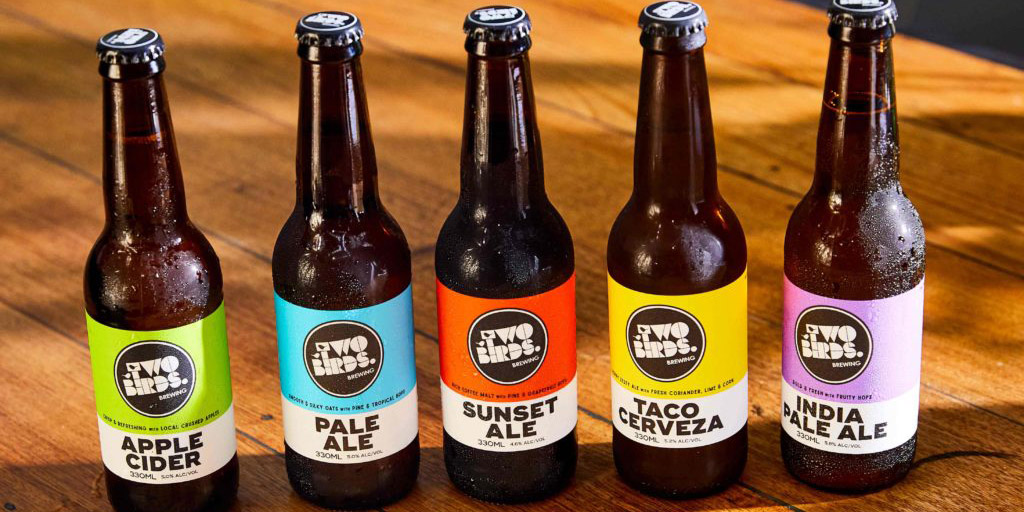Two Birds Brewing embracing glass as a circular resource May 2020

It’s probably fair to say that today’s consumers are much more aware of their purchasing behaviour and the effect that it has on our planet. We reflect on what we can do in our everyday lives to make things better, in even the smallest of ways.
Smart businesses like Two Birds Brewery understand this. They reflect this awareness in their approach to craft beer making. They make sure that their drive to contribute to a better world is aligned with that of their environmentally-focused customers.
Located in Melbourne’s western suburbs, Two Birds is Australia’s first female-owned craft beer brewing company. Co-owners and friends Jayne Lewis and Danielle Allen run the brewery. They knew that opting for infinitely recyclable glass packaging would provide the best quality vessel for their product while powerfully building loyalty with their target customers.
They loved the idea that the results of their hard work would be presented to their customers in a pure, clean glass bottle and that their bottles would be recycled and repurposed by a business only a kilometre down the road from their brewery, without any bottles leaving Australia.
“Fifty percent of the glass that makes our bottles comes from recycled glass and it’s all processed here in Australia. None of it’s been shipped overseas and within 30 days of it being put into recycling bins it can be back being filled with our beer,” says Jayne. “Our product looks right on the table in glass. It makes sense there. It’s part of the whole dining experience”.
Two Birds Brewing is a powerful example of the new breed of savvy business that mixes a strong desire for quality with great ethics and respect for the environment.
So, what is a circular economy?
A circular economy eliminates waste through continuing the use of recycled resources. Circular systems reuse, share, repair, refurbish, remanufacture and recycle to create a closed-loop system. This minimises the need for new resources to be fed into the system and reduces waste, pollution, and carbon emissions. It aims to keep products, equipment and infrastructure in use for longer, improving the productive life cycle of a product and creating a system where ‘waste’ can be reframed as ‘food’ for another process. This is in direct contrast to the traditional linear economy, which has a ‘take, make, and dispose’ production model.
New Zealand’s Glass Packaging Forum has produced a great video showing the circular story of glass recycling.
Glass is an ideal product within a circular economy
In New Zealand, 97% of people have access to either kerbside recycling bins or community recycling stations.
Collected glass, known as cullet, is then sorted into colours and used in the glass making process.
The glass making process all happens in Australia and New Zealand, keeping jobs local, and reducing the need for more previously unused glass to be introduced into the system. In fact, it only takes 1kg of recycled glass, compared with 1.2kg of previously unused glass to make the same amount of glass packaging.
The introduction of recycled material allows O-I Glass to run furnaces at lower temperatures, minimising carbon emissions along the way. Every 10% of recycled glass used reduces carbon emissions by 5% and generates energy savings of approximately 3%.
The process of recycling glass has no negative effects in terms of the quality of the end product. Glass can be infinitely recycled without losing quality, integrity, or purity. This makes glass the perfect example of a circular resource.
Working together towards a better world
When two businesses with similar values come together, good things happen. Such is the case with Two Birds Brewing and O-I Glass. The two have formed a direct working relationship that benefits the environment and their local community. Two Birds co-owners Jayne Lewis and Danielle Allen realise that not every craft beer brewer has a major glass manufacturer just two streets away. They wanted to make the most of their good fortune and see what extra benefits they could bring to the supply chain as a result.
Two Birds made the decision to become directly responsible for their glass waste stream. This means, for example, that bottles that couldn’t be used in production, for whatever reason, are shipped directly back to O-I Glass, instead of being deposited back into commingled recycling. This reduces the travelling distance for the product and supports the Spotswood local economy.
There’s a bigger picture for recycling glass in Australia that still needs to be considered. O-I Glass knows there is still work to do to increase the amount of glass that is recycled overall. It is making strong contributions where it can.
Every year, for example, O-I’s cullet processing plant in Queensland processes more than 85,000 tonnes of recycled glass. This diverts approximately 140,000 tonnes of glass from landfill.
The future looks good too
Due to start late 2020, one million households in the state of Victoria will have a new fourth ‘purple’ bin for glass containers. This will help to improve glass recycling rates and will mean that glass collection is of a much higher quality. For O-I Glass this provides the ability to use much more of the glass put out for collection and means that it can increase the percentage of recycled glass used in manufactured glass containers in Australia.
Alongside great industry partners such as Two Birds Brewing, O-I Glass will continue to reduce its carbon footprint through improved manufacturing processes, cutting carbon emissions, reducing energy usage, and increasing the amount of recycled glass used in its operations. Click here to learn more.
To get a sense of the objectives of the wider glass packaging industry in Australia, you can read the recently released APCO’s 2025 Recycled Content Targets here.

